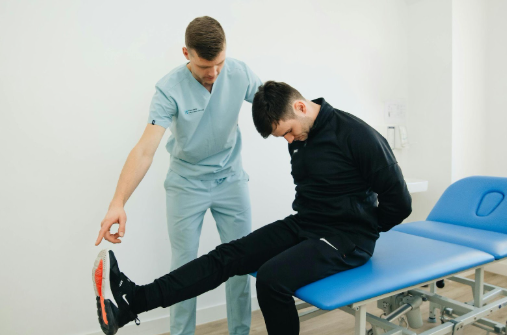Why Do I Have Neck Pain from Sleeping?
Why Do I Have Neck Pain from Sleeping?

Neck pain can leave you feeling miserable before the day even begins. If you're frequently dealing with pain in your neck after a night's sleep, you're not alone, as it’s actually more common than you’d think. Luckily, neck pain from sleeping is something that can often be fixed with a few adjustments to your sleeping habits and environment.
Your Sleep Position Matters
Some sleeping positions put more strain on your neck than others, and over time, that strain can result in soreness, stiffness, and even more serious issues like misalignment. Sleeping on your back is the best sleeping position, as it keeps your spine aligned and provides support to your neck as long as you use the right pillow. Sleeping on your side can also be good for your neck, but only if your pillow is thick enough to fill the gap between your neck and shoulder, keeping your spine straight.
Stomach sleepers are, unfortunately, much more likely to experience neck pain. Stomach sleeping forces your head to turn to one side, keeping your neck twisted for hours at a time. This unnatural position puts stress on the muscles and joints in your neck and can lead to long-term discomfort. Try transitioning to your back or side if you often find yourself sleeping on your stomach, and consider using a body pillow to help support your new position.
The Wrong Pillow Can Cause Trouble
If your pillow is too flat or too fluffy, your neck may not be in a neutral position, which can cause strain on your muscles and joints. A pillow that's too high forces your neck to bend forward, leading to tension in the muscles. A pillow that’s too soft or too flat, though, doesn’t provide enough support, causing your head to fall back and stretch the muscles in the back of your neck.
To solve this issue, look for a pillow that keeps your neck in a neutral position. For back sleepers, a thinner pillow may be best. For side sleepers, a firmer pillow with enough loft to keep your spine straight is ideal. You might also want to consider ergonomic pillows designed to cradle the natural curve of your neck.
Mattress Issues Contributing to Neck Pain
While your pillow is one piece of the puzzle, your mattress can be another when it comes to neck pain from sleeping. If your mattress doesn't offer enough support or if it’s too soft or firm, your entire spine, including your neck, may be out of alignment while you sleep.
Consider getting a medium-firm mattress that supports the natural curvature of your spine. Memory foam or hybrid mattresses can be excellent choices, as they contour to your body while offering the support needed for proper alignment.
Tension and Stress Build-Up
Neck pain from sleeping isn’t always purely physical. When you go to bed feeling tense or stressed, your muscles might be tight throughout the night, making you more susceptible to discomfort. People often unconsciously clench their jaw or tighten their neck muscles when they’re feeling stressed, even while sleeping.
Try stretching your neck and shoulder muscles before bed to help reduce stiffness in the morning. You might also consider deep breathing exercises or meditation to calm your mind and ease muscle tension before hitting the sheets.
Your Neck Alignment Throughout the Day
What you do during the day can affect how your neck feels in the morning. Poor posture, especially when you're working at a desk, looking down at your phone, or driving for extended periods, can strain your neck. Over time, this strain builds up and leads to neck pain after a night’s rest.
To combat this, keep your computer screen at eye level, avoid hunching over your phone, and take frequent breaks to stretch. If possible, adjust your workspace to be more ergonomic, which can help maintain proper alignment and prevent neck pain.
Underlying Health Issues
In some cases, waking up with neck pain could be a sign of an underlying health issue. Conditions like arthritis, herniated discs, or muscle strains may be to blame. These conditions can flare up during the night, especially if your sleeping position or pillow puts extra pressure on sensitive areas.
If your neck pain persists for more than a week or is accompanied by numbness, tingling, or headaches, it’s time to see a
healthcare professional. They can help rule out more serious conditions and provide treatment options tailored to your needs.
Is neck pain bothering you? Visit our team at
Arkansas Spine and Pain. We’ll get you properly aligned and on the road to a pain-free life in no time.
Contact us or schedule an appointment today!



